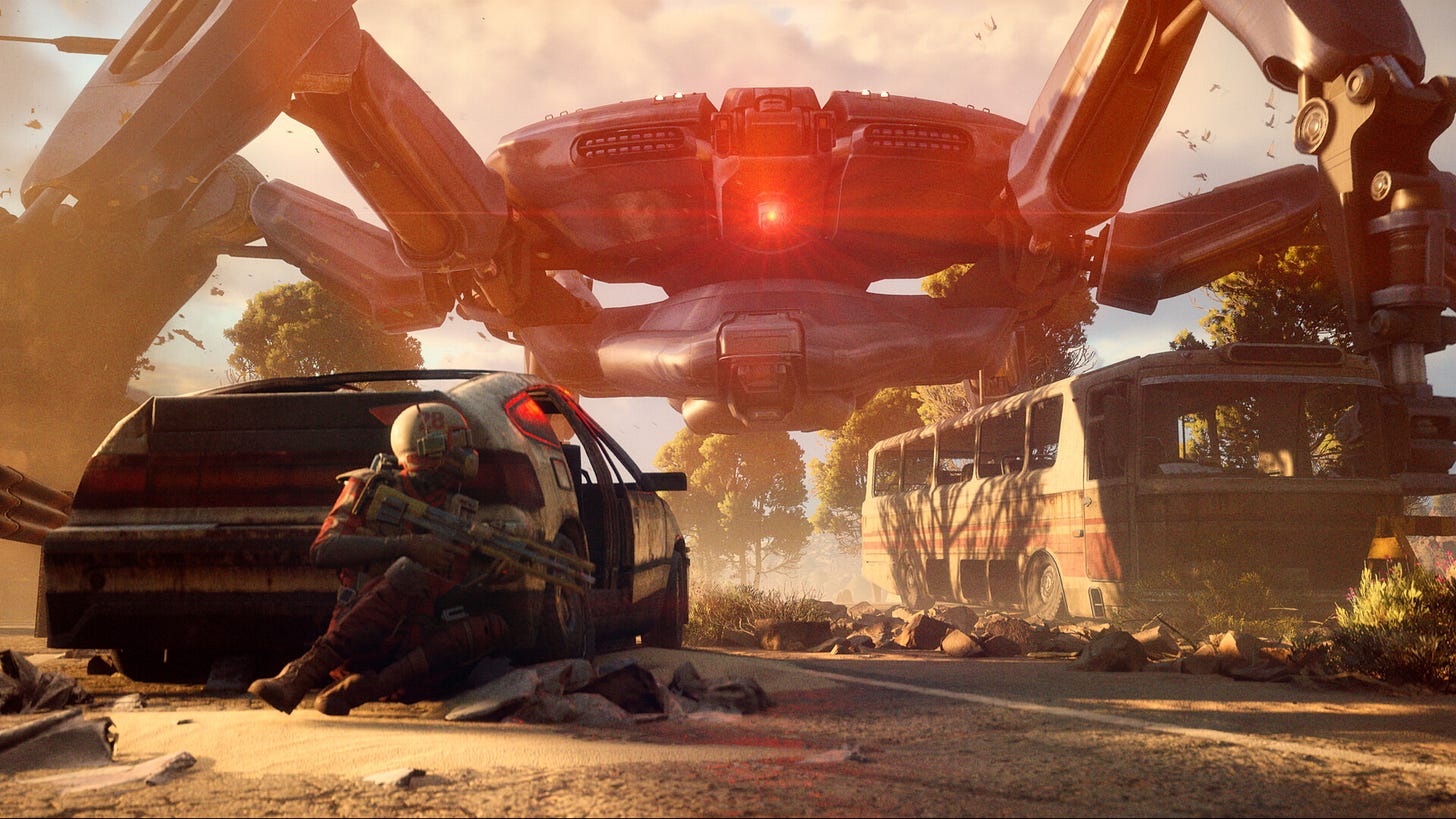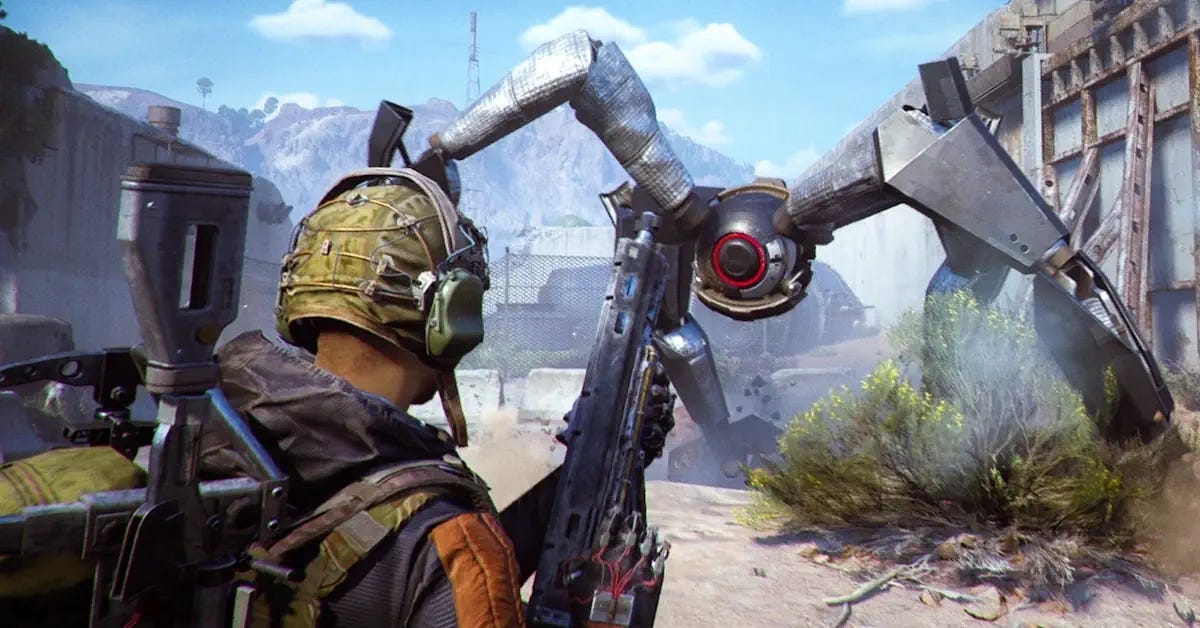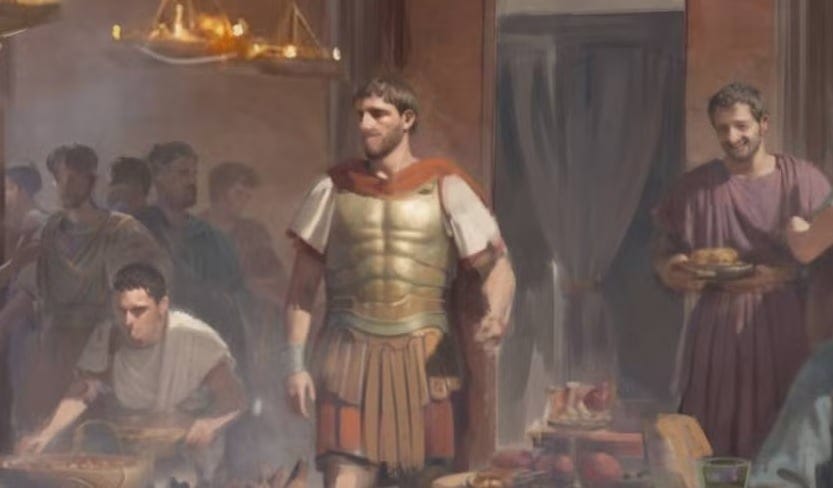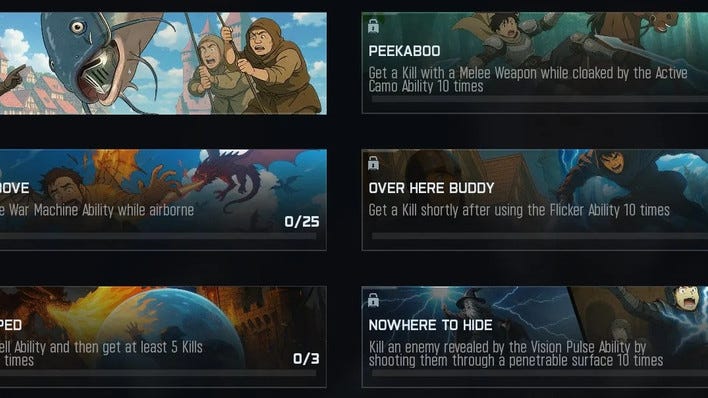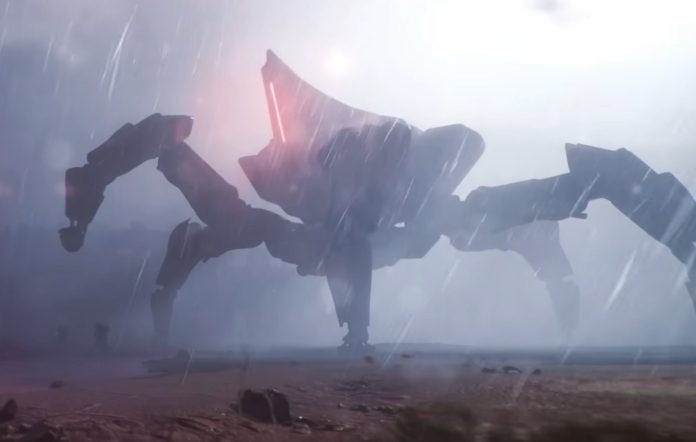Arc Raiders and the Ethical Use of Generative AI | 19/11/25
We discuss the issues surrounding Embark's use of AI voices
The use of AI voice models in Arc Raiders raises broader ethical questions.
Who is gaining from these business decisions?
What value does this bring to players?
The false argument of generative AI ‘levelling the playing field’
The AI and Games Newsletter brings concise and informative discussion on artificial intelligence for video games each and every week. Plus summarising all of our content released across various channels, like our YouTube videos and in-person events like the AI and Games Conference.
You can subscribe to and support AI and Games, with weekly editions appearing in your inbox. If you'd like to work with us on your own games projects, please check out our consulting services. To sponsor, please visit the dedicated sponsorship page.
Hello one and all. Glad to have you here for this week’s edition of the AI and Games newsletter. If you’re reading this on Wednesday morning, I am currently on a train to Paris for a visit to [undisclosed video game company] which you will most definitely hear about in a couple of weeks time.
For this issue we originally planned to report on my interview with the team at UK studio Meaning Machine about their work in using large language models (LLMs) for AI-native games. However, I opted to push it back a week (sorry guys), because an email crossed my inbox last week that warranted responding to, and it feeds very much into the discourse on Embark’s recently launched title Arc Raiders
Follow AI and Games on: BlueSky | YouTube | LinkedIn | TikTok
A Concerned Arc Raiders Fan Writes...
As many of you will know, we share a decent overlap in readership with the Video Games Industry Memo - and of course its creator George E. Osborn and I are good chums. To that end, George sent me a question intended for his ’Ask George’ Q&A editions from a concerned Arc Raiders fan, and he felt I would be in a better position to answer- how’s that for cross promotion?
Hello George,
I’ve finished a few hours on Arc Raiders and the topic of the recent Eurogamer review came up in chat. It made me wonder if the 2/5 star review was a fair opinion of the use of AI (both ML and Gen AI) in this game. And if you and/or the readers and contributors to VGIM could clarify.
Given that a) ML tends to be the less bad nay even good! version of AI and the Gen AI parts, as I understand it, were sourced from paid actors who knew what they were being paid for. Ergo, it is embarks own data its AI is learning from. Is this bad? Or is it just less bad than ‘standard’ gross AI that is reasonably fair to say is stolen content (vs paid for).
Do you reckon Tommy has an opinion on this? I just feel like it needs a firm pov and I can only find polarised ones.
Yes, I think Tommy may well have an opinion on this. I should avoid referring to myself in the third person - I’ve been told it’s one of Tommy’s most annoying qualities.
A Little Bit of Context
Arc Raiders is a new PvPvE extraction shooter from Embark Studios. It’s blown up on Steam and proven highly successful, with it recently surpassing my beloved Helldivers 2 - a game with similar concept and premise - in terms of all-time concurrent players. It’s doing very well.
As the author raises, the game uses a fair amount of AI within it. The enemy opponents in the game such as the Leaper, Bombardier and Queen don’t just use traditional ‘game AI’ tech for their behaviour, but they also use a custom-built animation system that is powered by machine learning. This is why the game has been on my radar since back in 2021 when Embark showed off the earliest prototypes, a video of which you can see below.
The 2/5 review in question we discussed during the news segment in last weeks issue and was posted on November 10th by Rick Lane over on Eurogamer, and while the sentiment towards the game is largely positive, the review outright condemns Embark for the use of TTS (text-to-speech) for the in-game human non-player characters (NPCs), i.e. AI-generated dialogue. These NPCs are voiced by real voice actors for a handful of key gameplay moments, but other incidental dialogue is achieved by using the pre-trained voice models based on the original actors.
Said Eurogamer review has then led to a broader conversation about the implications of using this technology in big budget games, though it seems to have had little impact on the broader sales and reception. At the time of writing the reviews on Steam are still largely positive.
You Ask George, Tommy Answers
First of all, thanks to George, and his reader, for sending this question over. I figured I’d have a pithy couple of lines in response to this, but over time it led to a much larger (roughly 3500 word) response.
The Arc Raiders situation is undoubtedly complicated, but it speaks to broader issues with the ethical adoption of AI technologies in game development. Perhaps critically, I think it raises the importance of consumers being conscious of how these technologies are being adopted, and the impact it has on the livelihoods of others, in a way that we historically have not had to think about with AI in game development until the last couple of years.
From my perspective, the key thing we should be thinking about is as follows:
When we utilise AI technology in games: for every gain we achieve, who is losing out as a result?
In this context, I think voice actors, players, and the industry at large are losing out from this decision. Let’s dig into why I think that is.
The Industry vs The Technology
Before I get into the meat of my response, it’s worth addressing the comment made regarding the ethics of the technology.
As discussed just recently in part 1 of my Game AI Existential Crisis essay, it’s important to remember generative AI techniques are not inherently evil or exploitative by default. Generative AI is but one form of machine learning that, by virtue of its capacity to generate ‘content’ with a reasonable degree of quality, is readily exploitable given the buffet of data made available by the modern internet and the lack of appropriate legislation preventing this behaviour. That said, you can train AI models using generative methods in ways that are not exploitative - see our recent case study on the MLMove project for example, and in fact our impending Meaning Machine interview.
My point being, generative AI is not inherently evil/unethical/bad. Rather, it’s how the technology is adopted by people making decisions that reflect their philosophies and politics. I think it’s critical we delineate between generative AI as a technology, and the industry that is trying to sell it to the masses. Otherwise we run risk of ignoring the genuine benefits generative models bring in a variety of use cases as context-sensitive models for processing complex data. After all we can use machine learning to be just as if not more evil when the correct data, and agenda, is put into practice. I appreciate this is a difficult sell in a world where we are being inundated with AI-generated slop on a daily basis, but it speaks to how quickly the generative AI industry has poisoned the well.
The use of AI voice models such as this arises from decisions being made by a broader eco-system of AI companies offering products derived from stolen content, combined with a AAA games industry desperate to cut costs and show it’s responding to investor demand. The use of a TTS system such as this is very much in Embark’s playbook, not just because they did it already for the announcer voices in The Finals, but the company has, since its inception, publicly expressed their desires to use technology as a means to expedite content creation in their game development processes. While this ambition perhaps didn’t seem as ethically dubious when they announced their intent in 2020, it’s now raising important questions worth asking.
A Precedent Has Been Set
By using a TTS system like this, where the voice models have been trained from the original performers, Arc Raiders and in-turn Embark have set a precedent on how this can be rolled out in the future.
It’s my understanding that the voice actors involved have been compensated for the use of trained models adopting their likeness. This would also make sense in a country like Sweden where any sort of tomfoolery would not be tolerated. But, it’s pretty much guaranteed those performers received less than the going rate for their regular services, given they didn’t have to go back in the booth to re-record all those lines.
Now on one hand, that means they’re still getting paid. So that’s a positive. But the success of a game like Arc Raiders - even at this early stage - will be an indication to the AI hype merchants and those counting the pennies, that this is a precedent that can be replicated.
One of Many Likely Outcomes
Pardon this brief digression, but the Eurogamer review proved rather timely given the day before it was published, I had lunch in London with a BAFTA-winning voice actor. We had arranged a get together to discuss the issues surrounding AI’s impact on voice acting, given we both recognise that this technology is disruptive to the profession, and not going anywhere anytime soon. Despite the severity of the topic, I had a great time, and I hope we can sit down for another conversation soon. But anyway, back to point…
During the lunch we theorised what possible future scenarios will arise as a result of using AI voice models. We came up with four trajectories, with Arc Raiders an example of one of them:
Some studios will opt to only use commercial AI voice models either because they can’t afford voice actors, or simply don’t want to pay for them.
Think small indie teams, and in the latter case mobile studios.
Some studios will insist on only using real human performances as a matter of principle.
Most studios will pay for voice actors for key sequences (cutscenes) and aim to have the rest achieved via TTS with trained models on a reduced fee.
Balancing quality for key moments with cost-effective implementation elsewhere.
This is pretty much what Embark has done with Arc Raiders.
A handful of studios will opt to put more than 50% of their VO budget towards use of celebrities such as sports professionals, and actors from film and television, and have the rest of the voice work be TTS implementations by trained voice actors.
i.e. Remember when Bethesda splashed all their VO budget on Patrick Stewart for the first 5 minutes of Elder Scrolls: Oblivion? Imagine that, but a lot worse.
The precedent is set because regardless of the negative response - and it’s been a big week for that - people continue to buy, for now at least.
Incidental Generative AI in AAA is the New Norm
Arc Raiders is but one of three AAA games that caught flack for the adoption of generative AI in the same week. Ubisoft’s Anni 117: Pax Romana was called out for use of generative art, while Activision issued a statement in response to being called out for AI art in calling cards (and other assets) in Call of Duty: Black Ops 7. As I discussed back in my 2025 predictions issue, I said we won’t see AI-native games launch from AAA (where generative AI is a critical part of gameplay), but we’d see more use in areas that can be easily removed if backlash goes against them.
This pretty much fits that bill: automated voice lines, incidental art. Stuff that can easily be replaced, with a nonsense PR statement of it ‘slipping through review’ or ‘enhancing productivity’ of the team. I do question why people keep doing this in an environment where the enthusiast audience doesn’t just catch it very quickly, but as we discussed recently over on The Take, these are the very same punters the AAA studios rely on to continue to survive.
Provoking the Customer
I find it all rather baffling, given the conversation surrounding AI in the eyes of consumers is so toxic right now, any adoption of generative models in a game that does not yield a positive improvement to the experience (whilst also not to the detriment of its developers) is simply not what players want to see.
Don’t get me wrong, contrary to my never-ending imposter syndrome, I’m not an idiot. I know this is being driven by economic reasons. A desire to cut costs, maximise profits, and placate shareholders and potential future investors. But it’s another classic example of short-termism, failing to grasp that the blowback from this is going to be far more severe than whatever flirtations the industry had with NFT and Web3. There is a need to have a more balanced approach to investing in AI and paying far more attention to how these new forms of the technology can support existing creative processes in games. Addressing the very real problems that exist in game development that are not the salary budget.
I mean as I was writing this, I clocked the story in which the CEO of Arrowhead Shams Jorjani was chatting over at The Game Business about he too feels there’s a need for a middle ground on the AI debate in game development. Clearly he’s not subscribed to AI and Games because y’know, that’s what we do here. Get on it Shams!
But the takeaway wasn’t the story, but the Bluesky post I linked to above. Go into the 200+ replies, and the 600+ quotes (at time of writing) this post has. It is full of angry, pissed off, and fed up players who are sick of hearing about how generative AI is going to make games better, only for the past two years to provide little of substance to that argument.
This was entirely predictable - I mean, I wrote about this eventuality in June of last year. There has not been any significant evidence of the value of generative AI to the end consumer, but it’s being forced upon them without any thought. No wonder they’re pissed off and fed up.
A Means to an Undesirable End
Sadly I think despite consumer sentiment, a lot of AAA studios are going to enter something of a death-spiral with generative AI adoption. In that they see it as means to cut costs and maximise profits, all while retaining an ‘acceptable’ (their words, not mine) level of quality. But even if sales begin to go down, which could be due to a generative AI backlash or a 1001 other market factors, I suspect they will only double down on its usage because now they need to cut costs even further to make up for their losses.
Far too often these business decisions are made in isolation of one another, but without thinking about the big picture. Microsoft ups Game Pass subscriptions by 50% and people hang on purely to play Black Ops VII, only for players to react negatively to generative AI usage - among other things. You can’t bolster Xbox’s profit margins if you annoy players such that they’re getting refunds and cancelling Game Pass courtesy of these short term gains. Far too often studios and publishers are not thinking about the big picture, what I referred to in my Devcom talk in August as the ‘perceived degradation of quality’, as all these issues stack up.
Perceived Degradation of Quality
Now I would argue the voice work in Arc Raiders is - per the authors comment - less icky than the art given it was trained with authorisation from the voice actors, and they were compensated. But being less icky doesn’t remove the ick - because in the case of Arc Raiders I fail to see the point in it.
From a players perspective, let’s just get the important part out the way: the voices are not great. I’ve since sat and played through the game some, and almost every single line of delivery sounds off. Like this beauty I found posted on Reddit.
Every single line of delivery from these NPCs suffers from a lack of emotional weight, from misplaced emphasis, and just bad timing. While I appreciate that this technology is still evolving, the big question is why did Embark bother with this other than to prove that they could?
I mused about this (again) in the Game AI Existential Crisis piece, about games being a sum of their parts, and the NPCs sounding like this does sour my perception of the game - despite the rest of the experience being really good.
Not just because it’s bad, not just because they thought they could get away with it, but because it delivers no meaningful improvement to the experience, and exists solely for monetary gain.
When Someone Gains, Who Loses?
Earlier I said we need to ask ourselves about who is gaining value from this? The answer in this instance is the studio, and specifically the management.
The voice actors receive less money than they would have for doing ‘less’ work, but their likeness is utilised.
Players receive a product that frankly doesn’t need this to be good.
The industry looks to the success of the game, and the lesson they will take from it, is this is acceptable behaviour.
Now my own personal politics are creeping in here, in that I see this as a means to cut costs in an area that is already poorly paid and suffers tremendous job scarcity, but there is also the question of why this is needed?
Speaking as a game developer myself, having worked on several titles in various capacities, one thing devs are very good at is making economic decisions given the technology and budget available, to achieve the larger creative vision. In this instance, it would make more sense to simply record the voice lines where necessary, and then have the rest of it be text-based with the occasional incidental bark - a standard that’s been established for decades courtesy of everything from Call of Duty 2 to Destiny 2.
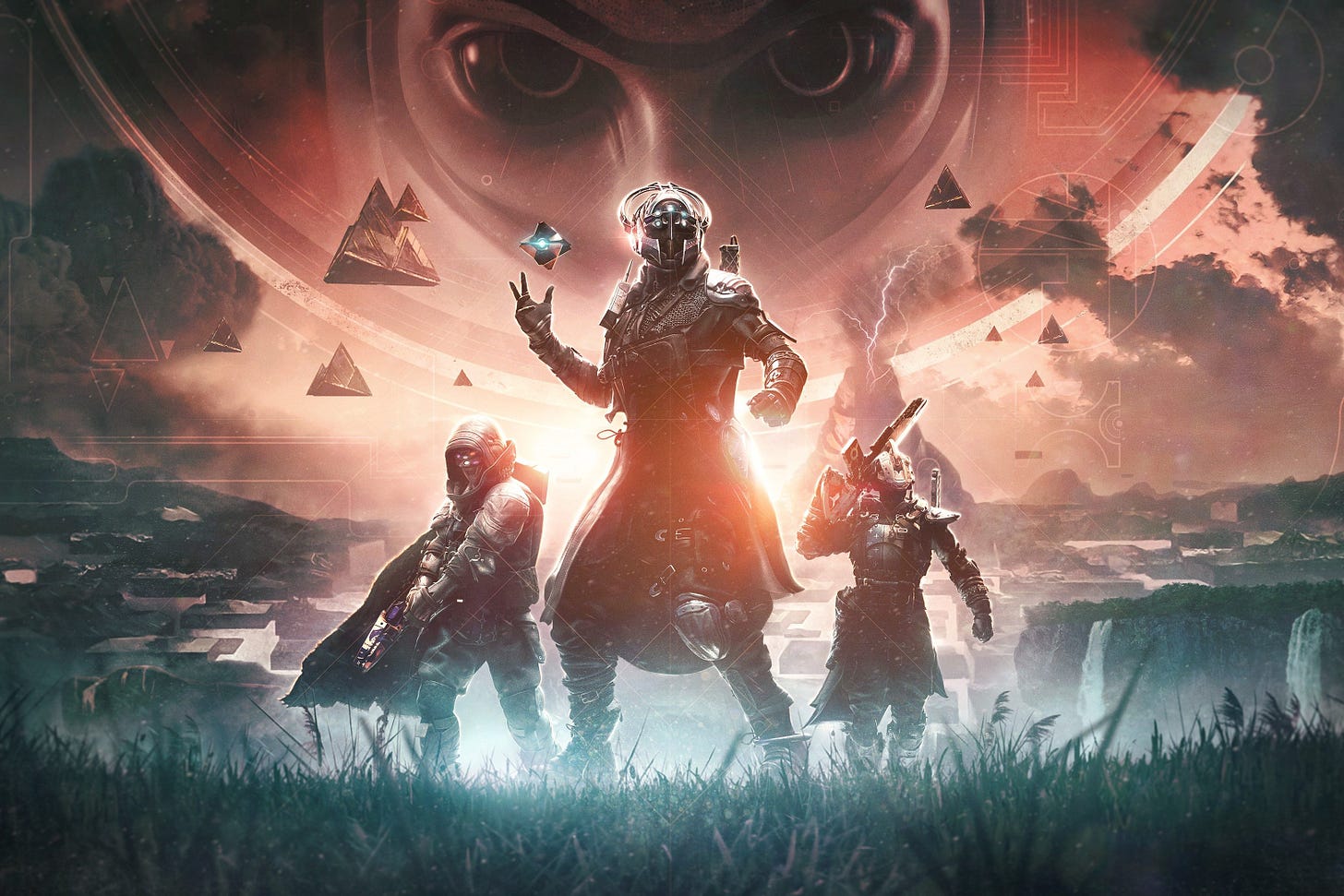
So while I feel the TTS system results in a loss for various parties, compare this to the animation technology we mentioned earlier. Can I just say, those animations look really cool! It delivers something that this game can point to as a unique selling point.
Plus, the studio still has animators working on the game. Having an ML-based animation controller like this still needs animators working on that project to ensure it is appropriately rigged and constrained - nevermind all the humanoid characters that still need animating. I feel like the animation systems are a good example of AI adoption because the value is across the board:
Developers have a solution to a problem that is very difficult (bordering on impossible) to do manually at high-quality.
It didn’t lead to animators losing their jobs at the studio.
Players get to face off against very cool looking enemy NPCs.
Studio probably saved some money along the way, or at least the research involved will prove to be a net positive in their broader understanding of AI technology.
Caveat #1: Context and Scale
Now I do have a couple of caveats to this, in that I raised earlier that the TTS voice work is not needed for this game to work. You could simply ignore this dialogue and get on with playing what is a very good online PvPvE shooter. Personally, I think use of this technology is largely acceptable if the game’s design only works courtesy of its adoption - and it has been done on the up.
I raise this given AI-native games that use LLMs to generate dialogue and story can only generate real-time dialogue using a TTS pipeline. Because there is no way to anticipate every possible line of dialogue and its delivery, such that you could dynamically stitch together a sentence.
And this brings another layer of complexity to the ethical debate, given at the moment most studios that are building games like this are indie given the risk involved. After all, this story pushed back my interview with Meaning Machine whose game Dead Meat (trailer above) is built by a small team of developers whose murder mystery title relies on LLMs and TTS to deliver a novel experience for players.
These games deserve their chance in the limelight, and to contributed to a broader conversation on what value AI-native games brings to players. That is assuming of course they have approached this in legal and ethically appropriate ways, which I know Meaning Machine has done - with their voice model built in collaboration with a voice actor.
It speaks to a conundrum, in that studios can and should be allowed to explore legally/ethically sourced generative models for their game designs. But it is far too easy for these to be exploited in areas of established professional practice to save a few quid. You’d think that AAA would take the high-ground on delivering ‘prestige’ gaming and let the indies figure out the practical aspects of putting generative AI to practice. But thus far everything we’ve seen of generative AI in AAA is cutting costs to deliver an inferior product, rather than delivering anything new or interesting. Meanwhile - as I predicted in my London Developer Conference talk in 2024 - we have a wave of indie studios coming out advocating their ‘AI free’ products which align with their values - and quite often their customers too.
I mean I didn’t take much stock in the ‘generative AI levels the playing field’ argument, but there you have it.
Caveat #2: What’s the Voice Actors Take on This?
A small but significant point: how do the voice actors feel about this? Are they happy to take the extra pay without the hassle of going back to the studio and recording more lines? My understanding is it is - like everything else in this piece - complicated.
Returning to my lunch conversation last week, we discussed the benefits to the use of AI models for voice actors. In that they can continue to bring money in for voice actors when jobs crop up they don’t have time to engage with, or even allow for ‘auditions’ by letting a studio use the voice model for initial versions, before bringing in the real deal for that final delivery with a human touch. The latter being a situation my lunch colleague has already experienced given AI models often struggle not just with emotional and contextual emphasis, but numbers and dates continue to be a problem for these models.
In fact one area that we discussed as useful is using AI models for more extreme vocal delivery, like screams, grunts, yells and otherwise. Unsurprisingly, conducting numerous takes of these activities is very stressful on the vocal chords, and could leave that person waiting a day or two for their voice to heal after the session.
But equally, while I think there are some potential benefits and opportunities, we know capitalism is going to do what capitalism will do, and the argument will be to insist the AI model is cheaper than the human talent. Personally I think it should go the other way. You charge for the AI model at a rate commensurate to regular voice delivery now - given you now have the added flexibility - and then actors charge a premium for getting them in the studio. But hey, I recognise that may well be wishful thinking.
In fact this is going to be recurring point on the newsletter in the next few weeks given after our Meaning Machine interview we have my sit down with the founder of Lingotion (tech demo above), who have worked with voice actors to figure out the legal and business side of making AI voice models for performers a practical and relevant future for them.
Ethical Consumption is a Broader Consideration Than Ever
In summary, I feel that the sad truth of the situation is that we now exist in an age where so much emphasis is placed on the consumer understanding how and why AI technology is being employed in commercial products. By understanding this, you can make a decision that reflects your own personal politics.
I have condensed everything from this piece into the questions below, and now I ask you - the reader- to consider this in the context of any of the AI-laden games mentioned in this issue:
Livelihoods: Does the use of (machine learning/generative) AI impact the livelihoods of workers involved in the project?
Replacement: Do you feel the use of AI in the project is a means to replace professional talent as a whole?
Enhancement: Does the use of AI fail to enhance the quality of the final product?
Substitution: Do you think the features in this game can be achieved at similar or acceptable levels of quality without generative AI?
If your answer is yes to any of these questions, then you have to ask yourself whether you are willing to part with your hard-earned cash. It’s sadly just another level of diligence required if you’re aiming to try and engage in any form of (near) ethical capitalism. Sadly adding to the 101 other political issues that might influence your purchase habits.
BTW, I’m really tempted to call this the L(a)SER questionnaire, but I’d have to move the questions around in a way that doesn’t quite work. If you can think of a better acronym let me know!
Wrapping Up
Well then, that was a bit of a detour huh? Thanks again to George and our mystery inquirer. I hope I covered the topic sufficiently, and left you with food for thought!
Thanks also to all you lovely people who got to the very bottom of this issue. Next week we’ll have the Meaning Machine interview, I promise! Au revoir!




